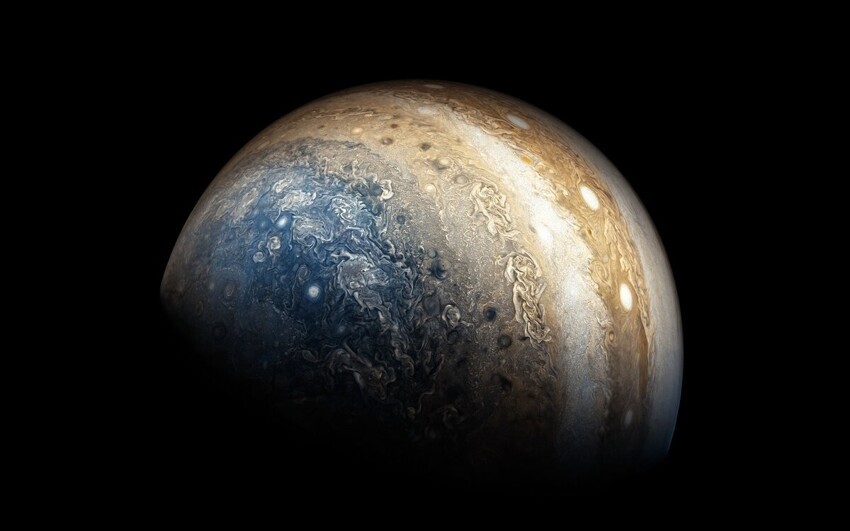Riddles of Jupiter: what is the planet hiding under its whirlwinds? (7 photos)
Jupiter is the second object after the Sun to influence on the formation and development of life on Earth. According to one of the hypotheses, it protects our world from the "attacks" of comets, attracting them to itself. 
The planet, seized in the power of violent storms, harbors in there are a lot of mysteries for which there is no exact explanation. 
Jupiter and other planets: a visual demonstration of the size
1. Jupiter was very happy with our visit
We all know about the auroras on Earth: a beautiful game the colors in the night sky are mesmerizing even in photos and videos, not to mention live surveillance! Jupiter also "glows" at the poles, but the auroras Jupiter is much more powerful than Earth. Still would! After all, the diameter of the "King of the Solar systems" is 11.2 times larger than the Earth's, in terms of its volume the planet exceeds ours by 1321.3 times, and in mass it exceeds the Earth by 317.8 times. Polar the aurora are so bright that they can be seen even from Earth. They look like bluish rings. But we have them only during periods of solar activity, and on Jupiter it is a stable phenomenon. The only thing changing is their intensity. Why don't they stop for a minute? Perhaps this is due to the collision of charged particles of the solar winds with molecular gases. However, this is not a proven explanation, but just a guess.
Interestingly, when NASA's Juno spacecraft flew up to Jupiter in 2016, the most powerful auroras in the history of observations. What is this, a salute in honor of our interplanetary station? It doesn't really look like a threat. take a closer look at the photo - the radiance clearly resembles a smiley. We will hope Jupiter is friendly! 
See the smiley?
2. Gives away more than it consumes
"Juno" took pictures in the infrared range: see stripes and spots? This indicates that under the cloud layer of Jupiter there is some powerful source of heat, because this planet radiates 60% more energy than it receives from the Sun. Why so many? Perhaps this is the result of tidal gravitational forces that arise when interaction of Jupiter with its satellites: the "king of the solar system" a lot of subjects - 79 satellites! Indeed, the royal number, None of the planets has so many "subjects". Another opinion is in the subsoil is undergoing radioactive decay. And another version - at the stage of its of the birth of Jupiter did not waste time in vain and accumulated a huge supply of thermal energy in the process of compression of matter.
3. Happiness was so close: I could have become a star
Like a star, Jupiter consists of hydrogen and helium, but the necessary he never gained mass: Jupiter would have to “get better” 80 times! But all the "food" in the form of matter from Jupiter was taken away by the power of its gravity Sun. Jupiter, along with its satellites, is very similar to the solar system. By the way, even stars exist in pairs (double star systems very many) - our lonely Sun is a rarity. Perhaps Jupiter is the formation stage of the solar system and was a pair of the Sun, but the Sun turned out to be too selfish, taking all the substance on himself. 
4. Broadcasting
Jupiter produces the most powerful radio signals in the entire solar system (after the Sun, of course). They are very different from others radio sources and its irregular character. Signals are made up of bursts, reminiscent of those bursts of radio emission that cause lightning discharges in our atmosphere. They can be explained by the fact that Jupiter - planet of storms, powerful streams of dense gases constantly collide and terrestrial lightning cannot be compared with those that sparkle on Jupiter - they are there in thousands of times longer than on Earth! Lovers of looking for aliens civilizations hope that these radio signals are not due to thunderstorms, but they have some other meaning, yet incomprehensible to us. 
Atmosphere of Jupiter as depicted by an artist
5. What does Jupiter want to tell us?
We did not understand the radio signals. Jupiter seemed to be trying to speak in another language - the Chandra orbiting telescope discovered sources pulsed x-rays, which are called x-rays spots - there is no explanation for this at all. 
x-ray spots
6. What does he have inside?
What Jupiter can hide from the inquisitive eyes of scientists under its restless clouds? Perhaps, if you follow the classical version, he has a hard, stony core. But there is another hypothesis that the fact that quite a large planet can hide inside Jupiter. WITH using computer simulations, scientists put forward a new version of the structure of gas giants: there were once planets in the solar system much more, and everyone bumped into each other. For example, our Earth collided with the hypothetical planet Theia, as a result of which she lost parts of their material - fragments were thrown into orbit, and from them the moon was formed. Large planets could also collide with gas giants, which later became their cores. Possibly in the bowels of Jupiter hides a planet about 10 times larger than Earth. 
7. Are we from Jupiter in an hour?
Of course, this version is in the style of RenTV, but still: how did life in the Earth? Many tend to believe that the primary components of life came to earth from space. Fantasies say that if Jupiter ever was a failed star, then maybe on one of its satellites was life? Europe is all covered with a thick layer of ice, but, be Jupiter though would be a dim star, the ice would melt there, and the place would be quite fit for life. On Europa, gravity is much weaker than ours, and think about the fact that man is a creature of unearthly origin forces a few facts:
- “To old age it pulls to the earth”, - have you heard the saying? Our the spine does not withstand the gravitational load, wears out quickly, what causes people to become hunched over;
- it is very difficult for a person to give birth, unlike many others animal species. Take, for example, a zebra: 15 minutes after giving birth, she ready to run from predators. How does a woman feel after 15 minutes after giving birth to a child?
- the eyes experience discomfort on sunny bright days (many they just can’t walk without sunglasses), and the skin burns very easy, so we needed a weaker star;
- man is the most cruel creature on Earth; no species of animal kills with such cruelty;
- despite this, humans are the weakest (physically) species on Earth, but the most advanced.
Who we are and where we come from is, of course, an interesting question.





















